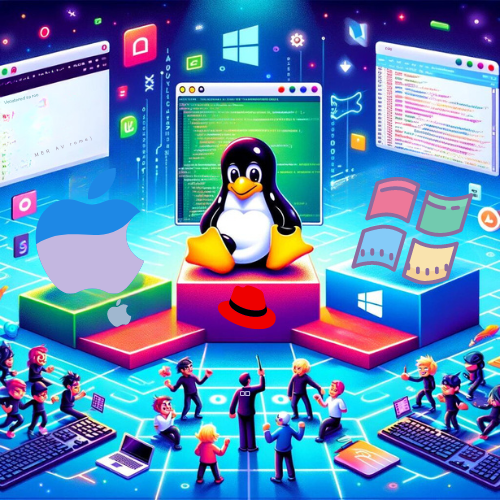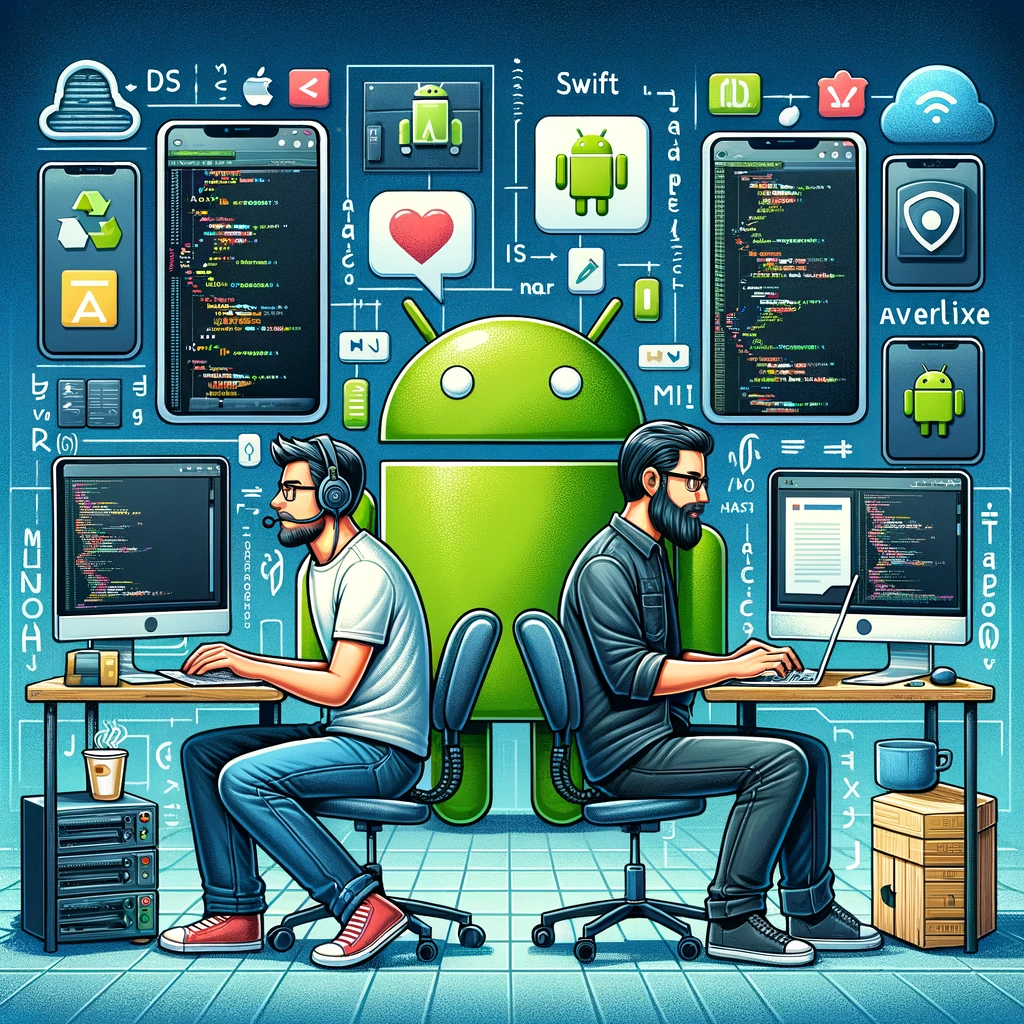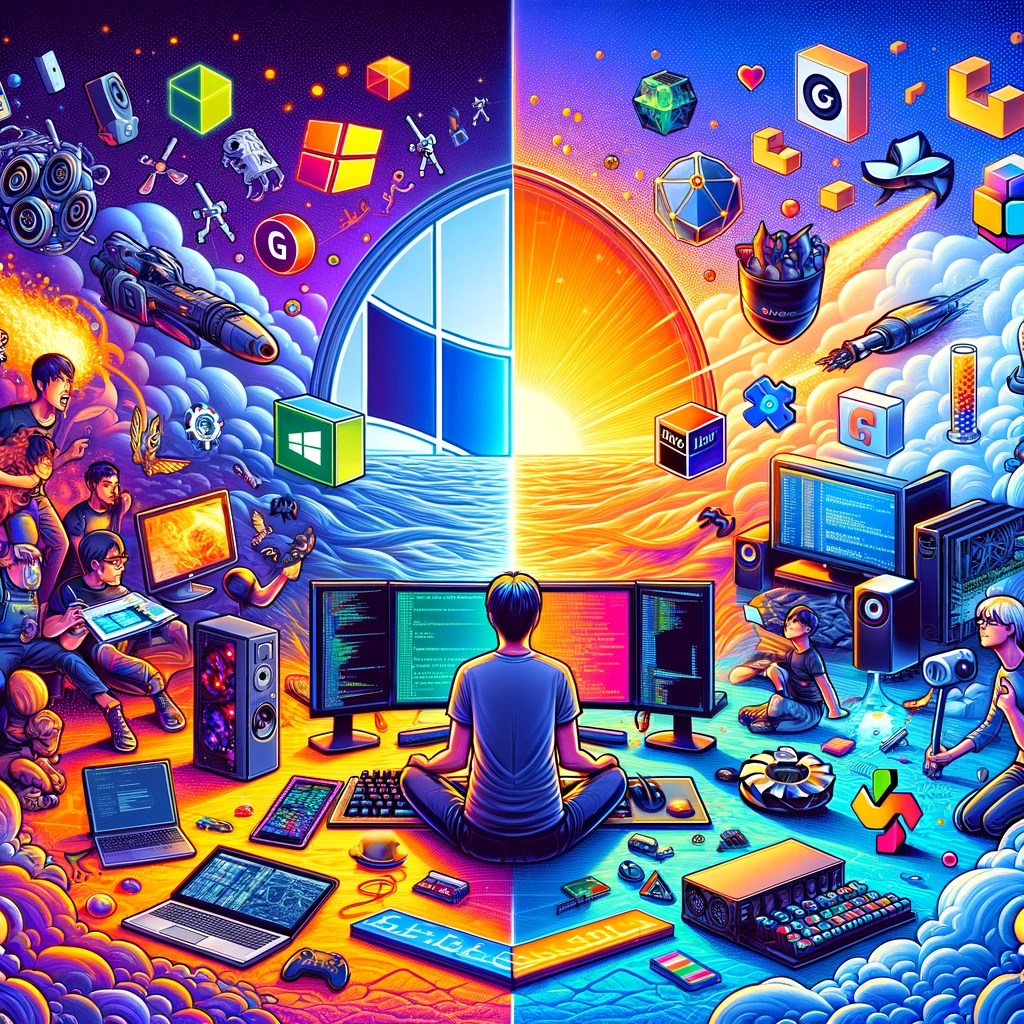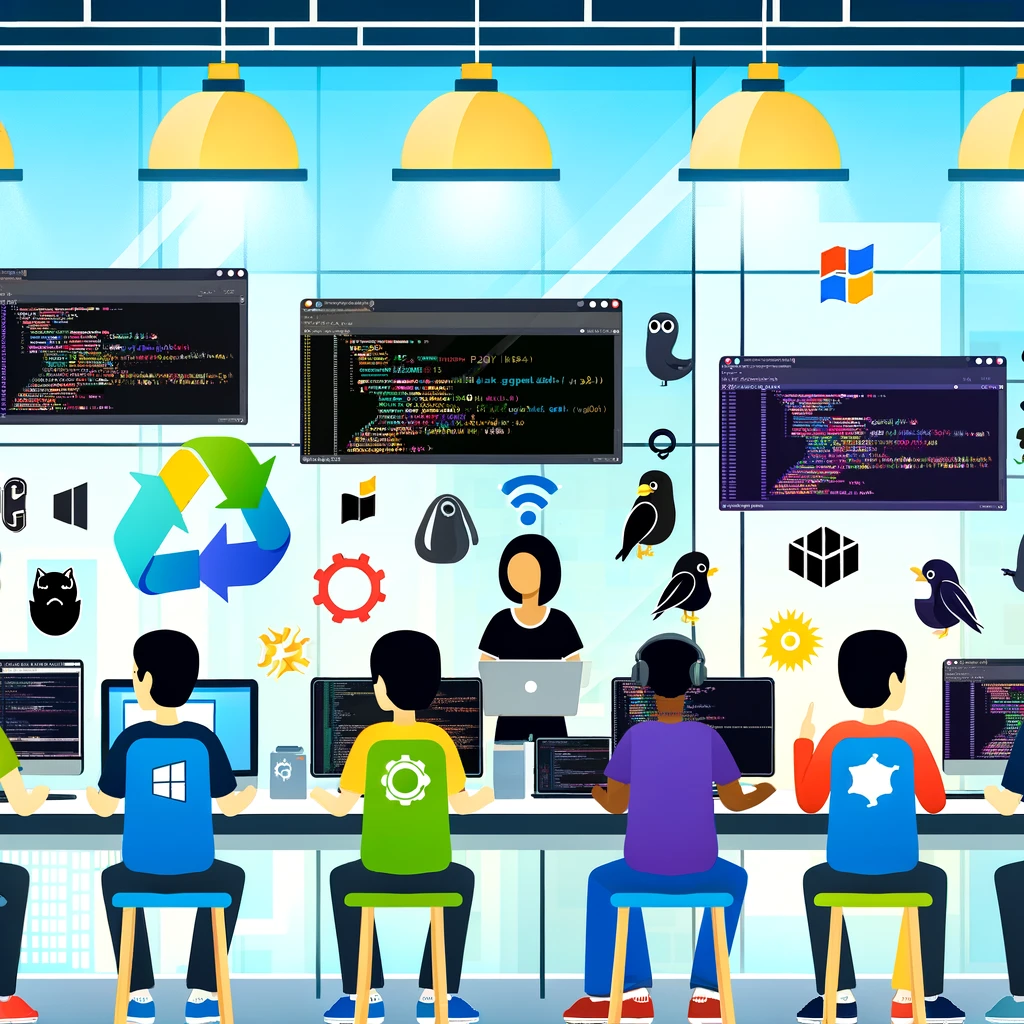Choosing the right operating system is like picking your dance partner in the grand coding ballroom. Will it be Linux, Windows, or Mac leading your programming waltz? This decision isn’t just about personal taste—it’s about finding the rhythm that matches your coding style. Let’s boogie through the basics and find the OS that will keep your code flowing and your spirits high. Ready to find out which platform will have you dancing through your development tasks?

What is the Best Operating System for Programming? Some might say it’s a matter of taste, but let me tell you, it’s important to consider a whole lot more. This isn’t just about the interface you like the look of or which startup chime warms your heart.
Mobile and Server Development
When it comes to mobile and server development, each operating system seems to have carved out its unique stronghold. For instance, if Android app development is on your agenda, you’re going to notice Linux stands out, thanks to its robust performance with Java applications. Tools like Android Studio and Visual Studio Code are making waves with their support for cross-platform development, further cementing Linux as a sound choice for mobile developers.

On the flip side, if iOS is your platform of choice, then you’re going to need a Mac. This isn’t just about preference; it’s about necessity. Apple has put up walls around its ecosystem, requiring encryption and developer certification that can only be obtained through macOS. This gatekeeping ensures that Mac remains an unavoidable stop for iOS developers.
Server development has traditionally been tied to languages like Java, C, and C++. This scenario is changing with the advent of .NET Core, which has broadened the horizons for developers by bringing C# into the mix. Now, server-side applications can be developed with .NET Core on both Linux and Mac, offering more freedom and flexibility than ever before.
So, what does this mean for you as a developer? If mobile app or server development is in your future, your OS choice may already be leaning towards Linux or Mac. But don’t worry too much about being locked in; you can always adjust your approach down the road. The key takeaway here is to choose something that resonates with you and aligns with the needs of your project or specialty.
Game Development and Machine Learning
I’m going to take you through the fascinating worlds of game development and machine learning, focusing on how different operating systems cater to these fields. Whether you’re an indie developer or a data scientist, you’re going to find out about how your choice of OS can influence your projects. And remember, this isn’t just about performance, it’s also about tool availability and community support.

The gaming industry has long favored Windows due to its widespread adoption and superior hardware compatibility. However, Linux isn’t far behind, especially with recent support from heavyweight companies like Nvidia and AMD, and initiatives like Valve’s Steam Deck bringing more attention to the platform. For Mac enthusiasts, the game development scene can feel a bit restricted. Nevertheless, tools like the Game Porting Toolkit are intended to help developers bring more content to Mac users.
When it comes to machine learning, it’s essential to understand that it’s a field with diverse OS requirements, often hinging on GPU power more than anything else. All three OS choices – Windows, Mac, and Linux – can accommodate machine learning development, but your preferences may vary depending on the frameworks you wish to use, such as TensorFlow or PyTorch, as well as the availability of drivers and resources to optimize GPU utilization.
Now, your OS choice might set the tone for your game or ML application, but don’t worry too much about being locked in forever. You can always adjust your approach down the road. What’s crucial is that you choose something that resonates with your current project needs and your hardware capabilities.
User Experiences, Development Tools, and Community Insights
I’ve talked through the various operating systems’ strengths and quirks, from mobile and server development standpoints to the versatility required for game development and machine learning. But at the end of the day, the real test comes from you, the devs on the ground, making magic happen with your code.
You’ve got insights straight from the trenches on how each platform shapes your programming life. Some of you adore Linux for its command-line prowess and lean operation, while others stand by Windows for its broad compatibility and intuitive tools for languages like C#. Meanwhile, many Apple aficionados can’t get enough of macOS’s Unix foundations and its slick integration with the Apple universe, despite the higher price tag.

The tools of the trade, like Visual Studio Code, PyCharm, Git Bash, and Docker, are virtually household names, and they play well across all these OSes. Consistent development experience across platforms means it’s easier than ever to jump from one OS to another.
If you’re picking up what I’m putting down, you know the community’s parting shot: Don’t tether yourself to just one OS for development. Being a versatile coder who can navigate multiple environments is your ticket to adaptability and portability—two hallmarks of the modern developer.
No matter your preference, Linux, Windows, or Mac, choose something that resonates with you and fits your project needs. There’s a lot of opportunity in each, and your first attempt doesn’t need to be your last. You can always adjust your approach down the road—just don’t focus too much on perfection. Be ready to learn and evolve with the technologies and platforms that keep changing the game.
Pros and Cons of Linux, Windows, and Mac
Of course, not OS is perfect, except Mac in my opinion…lol jk. Let me hear your arguments for your given platform. Ok, I’ll be objective now. Here is a list of the pros and cons I got from my good friend AI.
Linux
| Pros | Cons |
|---|---|
| Open-source and free to use | Can have a steeper learning curve for new users |
| Highly customizable | Less support for mainstream games and commercial software |
| Generally considered more secure and less prone to malware | Hardware compatibility issues, especially with very new or very specialized hardware |
| Large community support | Professional software (e.g., Adobe suite, Microsoft Office) may not be natively available |
| Efficient performance, even on older hardware |
Windows
| Pros | Cons |
|---|---|
| Wide compatibility with software and hardware | More vulnerable to viruses and malware without proper protection |
| User-friendly interface for beginners | License cost for Windows OS |
| Extensive support for gaming and professional software | Can be resource-heavy, affecting performance on older or less powerful hardware |
| Regular updates and support from Microsoft | Updates can be frequent and sometimes cause issues with existing software |
| Large ecosystem of peripherals and accessories designed for Windows |
Mac (macOS)
| Pros | Cons |
|---|---|
| Highly integrated ecosystem, especially with other Apple products | Higher cost of entry compared to most Windows and Linux machines |
| Generally more secure out of the box | Less customizable in terms of hardware and software |
| User-friendly interface and robust built-in software | Limited game library compared to Windows |
| Excellent build quality and customer support | Hardware upgrades are difficult or impossible for most models |
| Optimized for creative professional software (e.g., Final Cut Pro, Logic Pro) | Less software variety compared to Windows |
If you would like to read more information about pros and cons, click the link below.
Conclusion
Ok, lets admit it, Windows is terrible and Mac reigns supreme, jk.
When I had a Windows laptop back in 2016 the thing only lasted for 3 months because they easily get viruses. I recommend Mac or Linux over Windows just because of the security.
Lets hear your comments and see if you can convince me over to your favorite OS.
Thank you for reading my post. Leave your comments below to participate in this engaging community. Be sure to sign up to receive updates of more incredible articles.
I have been in the web development industry since 2016. It is my desire to guide aspiring and seasoned developers alike through the complex landscape of web development and software engineering. I combine my academic prowess, with degrees from Western Governor University and a Boot Camp certificate from Bloom Tech, with real-world experience to educate and inspire.
As the force behind DevTuneUp.com, I offer a treasure trove of tutorials, how-tos, and insights into the ever-evolving tech industry. With a sharp focus on demystifying technology and a goal to make DevTuneUp.com a cornerstone for tech enthusiasts, I leverage my expertise in SEO optimization and social media marketing to reach and empower a global audience. Join me on this journey to navigate the digital world with confidence and skill.
Hey there! I just read your blog post on finding the best operating system for programming, and I must say, it’s an excellent guide for fellow programmers like myself.
Your article provides a comprehensive overview of the top operating systems commonly recommended for programming: Linux, macOS, and Windows. I appreciate how you highlighted the key features and benefits of each, making it easier for readers to understand their options.
As a Linux user myself, I completely agree with your assessment of its flexibility, security, and extensive support for programming languages. The various Linux distributions available, such as Ubuntu and Linux Mint, offer a customizable experience that caters to different needs and preferences.
Moreover, you did a fantastic job explaining why macOS is a popular choice among programmers. Its Unix-based foundation, user-friendly interface, and powerful terminal make it a solid option, especially for those working on Apple-related projects.
And of course, Windows, being the most widely used operating system, has its own advantages. Its user-friendly interface, extensive software compatibility, and strong developer community make it a reliable choice for many programmers.
I appreciate how you acknowledged that the best operating system for programming ultimately depends on personal preferences and specific programming tasks. It’s great that you provided readers with the necessary information to make an informed decision based on their individual needs.
Overall, your blog post is well-written, informative, and easy to follow. It’s a valuable resource for programmers who are looking to choose the right operating system for their coding journey. Keep up the fantastic work!
Marios
I personally am a Mac user, but tried to read this with an unbiased opinion.
The article compares Linux, Windows, and macOS for programming, covering mobile and server development, game development, machine learning, user experiences, and community insights. It presents pros and cons for each OS, but maintains a humorous bias towards macOS. Objectivity and individual preferences are advised for choosing the best OS. Everyone needs something different out of their operating system so there is no way to suggest one superior to the others. I do like Mac though. Great article
Jordan, your post brilliantly encapsulates the intricate dance between operating systems and programming, likening it to a grand ballroom where each OS leads its unique waltz. Your breakdown of Linux, Windows, and Mac for various development tasks offers invaluable insights into their respective strengths and nuances. The analogy of mobile and server development as dance partners elegantly illustrates how each OS excels in different realms, be it Android on Linux or iOS on Mac. Furthermore, your exploration of game development and machine learning sheds light on the diverse landscapes these fields traverse across different platforms. Lastly, your call for versatility among developers to embrace multiple OS environments resonates deeply, emphasizing adaptability and portability as key attributes of modern coding. Kudos on a thought-provoking post that invites lively discussions within the programming community
Jordan, your post brilliantly encapsulates the intricate dance between operating systems and programming, likening it to a grand ballroom where each OS leads its unique waltz. Your breakdown of Linux, Windows, and Mac for various development tasks offers invaluable insights into their respective strengths and nuances. The analogy of mobile and server development as dance partners elegantly illustrates how each OS excels in different realms, be it Android on Linux or iOS on Mac. Furthermore, your exploration of game development and machine learning sheds light on the diverse landscapes these fields traverse across different platforms. Lastly, your call for versatility among developers to embrace multiple OS environments resonates deeply, emphasizing adaptability and portability as key attributes of modern coding. Kudos on a thought-provoking post that invites lively discussions within the programming community
This is a very informative and helpful post on operating systems. I have always worked with Windows, so it is interesting to see that you favour Linux and Mac, and that Windows are terrible.
If I want to switch from Windows to Mac, do I need an Apple computer? Or can Mac be run on an HP laptop? Is there a steep learning curve with Mac if one has always worked with Windows? Thank you for your advise.
Its advise to only use apple products instead of hp, because it is not legal and against Apple’s End User License Agreement (EULA) for macOS. Ther are also compatability issues.
There us not a steep learning curve
Hey Jordan –
Windows is the best operating system for the following reasons. The OS has been around for a while, so it has extensive support for gaming and professional software. Also, it is user-friendly, unlike Linux. That said, what OS you choose depends on what you are trying to achieve.
I dislike how Macs are not open or customizable; however, they are powerful. Aspiring developers and current ones must be able to adapt despite their preferences. The TIOBE index shows programming languages move up and down the chart.
What programming language(s) do you code with or prefer?
I like Javascript or Python, but C# might be a go to for me for strongly typed. What about you?
Hi Jordan,
I am personally not a developer, but I have some basic knowledge of the subject. When I worked in an online marketing company, the developers preferred Macbooks. They developed contests for Facebook and websites, landing pages, and email automation. It is a CRM and I do remember they were using Ruby on Rails to do all that.
I am not sure what the reason for choosing iOS was, but it probably has to do with the viruses you mentioned and similar stuff that can happen using Windows.
Anyway, it is a very informative article and I will suggest it to anyone interested in the subject. Well done!
Dan